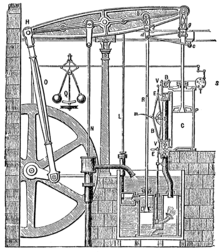Technology won’t solve environmental issues and you know it
EDIT: I recorded a podcast version of this post (episode 63) that covered same views beyond this post:
If anything marked the beginning of the industrial revolution, it was James Watt’s steam engine. It wasn’t the first steam engine, but was more efficient than any before.

A Watt Steam Engine
More efficient means using less energy and less pollution, right?
Wrong.
Each engine, yes, but more people used engines, so Watt engines used more energy and polluted more than anything. They drained mines, which helped collect more coal, which fed more engines.
The direct result is today’s polluted world. If you fantasize that technological improvements will, after centuries since the industrial revolution increasing pollution and demand for natural resources somehow, magically, in your lifetime change their effects, you’re dreaming.
Two main effects drive this pattern—obvious when you see them, however counterintuitive at first. People believe self-serving myths in the opposite direction of millennia of countervailing evidence, probably because they prefer comfort and convenience over the guilt that would come from conscious awareness of how they’re hurting other people. We know the polluted world we were born into. We know the pollution we’re causing—that is, unless we keep lowering our self-awareness with myths.
Efficiency increases overall use, not decreases
When costs drop, people use more. For example:
- LEDs are more efficient than incandescents and now people light things they didn’t—by more than the energy saved.
- Gas engines are more efficient today than decades ago and people make cars bigger, heavier, and faster—so mileage is lower than many cars from half a century ago.
A similar effect: building more lands and roads creates more traffic. People already project that autonomous vehicles will increase traffic too.

When will we learn?
If you think electric cars, solar power, nuclear power, a hyperloop train system, etc will lower pollution, you’re ignoring history.
Making a system more efficient achieves its goals more
Steam engines, LED bulbs, nuclear reactors, and technology in general are elements of a system. Even the whole economy is an element of a global system including the environment and other human systems.
The goals of this overall system have long included growth and individual comfort and convenience. As long as those goals remain, technological innovation will drive them over competing considerations such as conservation and community.
We took generations to learn that building more roads increased traffic, congestion, pollution, time lost, and so on. In that time we locked in infrastructure parts of which will endure centuries, increasing traffic, congestion, pollution, time lost, and so on.
As long as we hold on to these myths that solar planes or whatever will lower overall pollution, we’re locking in more damage.
How you know it
If you think, “Technology may have increased pollution since the steam engine and before, but this time it will be different,” then you see that we have to change just applying technology as we used to.
You know that for a different result we have to do things differently. Efficiency alone won’t reduce pollution and will likely increase it.
There is a way out
We don’t have to work within the system. We can work on it.
Instead of making the existing polluting system more efficient, we can change the system. That’s the point of my Leadership and the Environment podcast. Leaders change systems. Some do, anyway.
Steam engines, LED bulbs, nuclear reactors, and technology in general affect parts of this system but they don’t change it overall.
Changing the beliefs and goals of a system change it. I’m trying to help people change their beliefs and goals—not just anyone but influential people that many follow. If we don’t change the most influential people then people will keep following them and not adopt new beliefs and goals.
We’ve done it before. We can do it again.
Christianity was more merciful than many systems before it.
Buddhism was more compassionate.
The Enlightenment more observation-based.
Science more skeptical.
We’ve changed systemic goals many times.
We can change from growth—always wanting more—to enough, or as I think: loving what you have. When you realize you can’t have everything, you learn to appreciate, celebrate, and love what you have—in my experience more than when you believe the fantasy.
We can change from individual comfort and convenience to responsibility and caring how we affect others. As any parent, pet owner, or team member will tell you, taking others into account and caring how you affect them increases your compassion, empathy, and overall emotional reward.
Read my weekly newsletter

On initiative, leadership, the environment, and burpees
Pingback: My favorite posts | Joshua Spodek
Pingback: Elon Musk does the opposite of help nature » Joshua Spodek
Pingback: Rants, raves, and monologues, volume 2 » Joshua Spodek